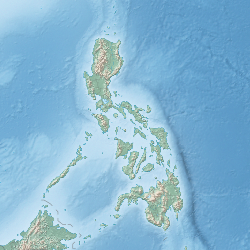Igbon Island
 Aerial view with Igbon Island in the center | |
| Geography | |
|---|---|
| Coordinates | 11°12′28″N 123°10′24″E / 11.20778°N 123.17333°E |
| Archipelago | Concepcion Islands |
| Adjacent to | Visayan Sea |
| Highest elevation | 774 ft (235.9 m) |
| Administration | |
| Region | Western Visayas |
| Province | Iloilo |
| Municipality | Concepcion |
| Barangay | Igbon |
| Demographics | |
| Population | 2,547 (2010) |
 | |
Igbon Island (variously Polopina Island or Balubadiangan Island) is an island and barangay in northeastern Iloilo, Philippines. It is part of the municipality of Concepcion. According to the 2010 census, it has a population of 2,547.[1] The island is moderately known in the Philippines for its scuba diving.
Location and geography
[edit]Igbon Island is east of Panay Island in the Visayan Sea. Part of the Concepcion Islands, it is a wooded island and is 774 feet (236 m) at its highest point.[2] Igbon is 3.2 kilometres (2 mi) east of Tago Island. Other nearby islands include Bulubadiangan Island and Danao-Danao Island.[3] Its sole barangay is Igbon, which has one school, the Claudia Morata Villarias Memorial School.
Natural disasters
[edit]Guimaras oil spill
[edit]On 11 August 2006, a tanker capsized off the coast of Guimaras Island south of Panay. The tanker spilled over 200,000 litres (44,000 imp gal; 53,000 US gal) of oil into the Panay Gulf. By the end of August 2006, oil had covered more than 245 kilometres (152 mi) of coastline.[4] In September 2006, the Regional Disaster Coordinating Council (RDCC) identified Igbon as one of 38 municipalities threatened by the oil spill.[5]
Typhoon Haiyan
[edit]In 2013, Typhoon Haiyan (locally known as Yolanda) caused heavy damage to Igbon. The typhoon unexpectedly struck Igbon at low tide, although residents were able to take shelter near the mountain areas.[6] Relief workers distributed food aid to island residents after the storm passed.[7]
See also
[edit]References
[edit]- ^ "2010 Census of Population and Housing" (PDF). Philippine Statistics Authority. 2010. p. 62. Archived from the original (PDF) on 15 November 2012. Retrieved 17 June 2014.
- ^ U.S. Coast and Geodetic Survey, Reuben Jacob Christman (1919). United States Coast Pilot, Philippine Islands, Part 1. U.S. Government Printing Office. p. 225. Retrieved 17 June 2014.
- ^ "Sailing Directions (Enroute) Philippine Islands" (PDF). National Geospatial-Intelligence Agency. 2008. p. 92. Retrieved 17 June 2014.
- ^ "Oil Spill Near Guimaras Island". NASA. Archived from the original on 16 March 2010. Retrieved 17 June 2014.
- ^ "31 Days of Agony". Guimaras Oil Spill. Panay News. Retrieved 17 June 2014.
- ^ "Column: One month on from Typhoon Haiyan it's essential we get people back to work". thejournal.ie. Retrieved 17 June 2014.
- ^ Ahem, Claire. "In Typhoon-Ravaged Concepcion, Not Afraid to Look Back but All Eyes on the Future". Concern Worldwide. Archived from the original on 14 July 2014. Retrieved 17 June 2014.

